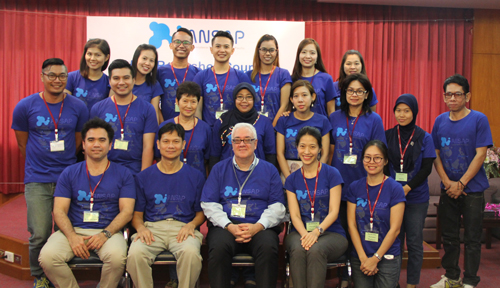
ANSAP researchers from Indonesia and Malaysia attend a training hosted by Dr. Phanuphak (first row, second from right) in Bangkok in November 2014.
In 2008, the Thai Red Cross AIDS Research Centre, a TREAT Asia network member in Bangkok, opened the Anonymous Clinic—a sexual health clinic with specific services for men who have sex with men (MSM). Because MSM living with HIV are twice as likely as those without HIV to develop the anal cancer associated with human papillomavirus (HPV), the clinic determined to start screening its patients for anal precancers.
Using funding from amfAR’s MSM Initiative (now the GMT Initiative), they purchased the high-resolution anoscopy microscope necessary to diagnose and treat both anal warts and precancerous anal lesions, and began providing anal Pap smears and treatment free of charge. This not only benefited their patients, it also generated some of the first data about HPV and anal neoplasia—the final stage the lesions reach before developing into cancer—among MSM in a resource-limited setting in the Asia-Pacific. TREAT Asia has been supporting the project since 2009.
The Thai Red Cross team found that approximately 10% of HIV-negative and 20% of HIV-positive MSM in Bangkok had pre-cancerous lesions, and almost 60% of positive MSM were infected with the strains of HPV most likely to progress to cancer, twice the rate of negative MSM. HIV-positive MSM were also much less likely to clear the infection without treatment, increasing their risk of developing anal neoplasia in the future.
“The results have generated ongoing discussions in Thailand about studying the cost-effectiveness of an anal cancer screening program and including anal cancer screenings in the National Guidelines for HIV Treatment and Prevention for the first time,” says Dr. Nittaya Phanuphak, from the Thai Red Cross, who heads the study.
In 2012, three additional TREAT Asia network members—Udayana University & Sanglah Hospital in Bali, Indonesia, Cipto Mangunkusumo Hospital in Jakarta, Indonesia, and the University of Malaya in Kuala Lumpur, Malaysia—approached the Thai Red Cross about establishing similar programs at their facilities. The participating clinicians from all four sites then established the Anal Neoplasia Study in the Asia Pacific (ANSAP).
HPV-associated anal cancer is preventable if precancerous lesions are identified and removed, but many MSM are unaware of the risk and most regional medical facilities cannot afford to purchase high-resolution anoscopy equipment. As a result, little data exists on anal cancer and HPV among MSM in many parts of the world. As part of the study, ANSAP is searching for biomarkers that could provide clinics with a more affordable method for identifying patients with precancerous lesions.
Using support from TREAT Asia, the AIDS Life Foundation, the U.S. National Institutes of Health, and University of California, San Francisco, the new ANSAP sites were able to purchase the machines, offer clinician trainings, and initiate their collaborative research studies. Each site began enrolling patients in 2013, and while analysis is ongoing, preliminary results indicate that MSM in Indonesia and Malaysia have a similar prevalence rate of high-risk HPV infection as those in Bangkok. The network plans to use the results to advocate for better policies related to HPV among MSM throughout the region.
“This success shows how a relatively limited investment can make a major difference in the lives of GMT individuals,” say Kent Klindera, director of the GMT Initiative. “And by focusing on the immediate concerns of clients, in this case anal warts, opportunities are created for clinicians to engage GMT individuals in longer-term concerns, such as reducing the spread and impact of HIV/AIDS.”